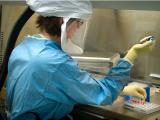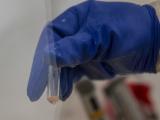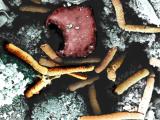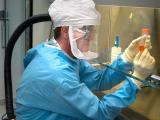Sep 19, 2008 (CIDRAP News) – Sen. Patrick Leahy, chairman of the Senate Judiciary Committee and a target of the 2001 anthrax attacks, said this week that he disbelieves the FBI's conclusion that Dr. Bruce E. Ivins was the sole perpetrator of the attacks, according to news services.
Meanwhile, Peter B. Jahrling, a leading government biodefense scientist, told the Los Angeles Times this week that he had erred in 2001 when he told Bush administration officials that the anthrax used in the mail attacks probably had been modified to make it more lethal.
Senator doubts FBI chief
Leahy, at a Sep 17 hearing of his committee, told FBI Director Robert Mueller III that he thinks other people were involved in the attacks, but he did not explain his reasons, according to an Associated Press (AP) report. Other committee members also voiced doubts about the FBI's conclusions, according to news reports.
Leahy, a Vermont Democrat, was one of two senators, in addition to several media offices, that received envelopes containing anthrax powder in the fall of 2001. The attacks killed 5 people and sickened 17 others.
Ivins, a microbiologist who worked at the US Army Medical Research Institute of Infectious Diseases (USAMRIID) in Frederick, Md., died of an apparent suicide on Jul 29 as the FBI was preparing to charge him in the case. On Aug 6 the FBI announced its conclusion that Ivins was the sole perpetrator and released a number of documents, mostly search warrant affidavits.
Leahy said at the hearing, "If he is the one who sent the letter, I do not believe in any way, shape, or manner that he is the only person involved in this attack on Congress and the American people," the AP reported.
"I believe there are others who could be charged with murder," Leahy added. "I just want you to know how I feel about it as someone who was aimed at in the attack."
Mueller replied, "I understand that concern," but he defended the FBI's view that Ivins was the only culprit, the AP reported.
"We have looked at every lead and followed every lead to determine whether anybody else was involved, and we will continue to do so," Mueller said.
'An honest mistake'
One of the controversial questions in the anthrax case has been whether the anthrax powder used in the attacks was weaponized, or treated to make it spread better through the air and penetrate into the lungs. Such treatment would be difficult, making it less likely that one person was responsible for the attacks, experts have said.
A Sep 17 Los Angeles Times report said Jahrling, the senior civilian scientist at USAMRIID in 2001, had studied the anthrax used in the attacks, work that was detailed in a 2002 book by Richard Preston. Using an electron microscope, Jahrling detected what he believed to be signs that silicon had been added to the material, the story said.
Jahrling reported this to his superiors and was subsequently summoned to the White House to brief top administration officials, the Times reported.
But in response to e-mailed questions from the newspaper, Jahrling said this week that he had been wrong.
"I believe I made an honest mistake," he told the Times, adding that he had been "overly impressed" by what he saw under the miscroscope.
A virologist, Jahrling also said, "I never should have ventured into this area," referring to the study of anthrax, a type of bacteria, the story said.
He was careful at the time not to implicate Iraq or any other government in the attacks, but others used his analysis to allege that the silicon suggested possible involvement by Iraqi President Saddam Hussein, the Times reported.
As reported previously, FBI scientists and outside experts hired by the FBI to analyze the anthrax used in the mailings announced Aug 18 that they had found silicon, but they believed it occurred naturally and was not added to the material.
Lawmakers want role in review of case
In other developments at the Senate hearing, Sen. Arlen Specter, R-Pa., demanded to have a role in choosing scientists who will conduct an independent review of the FBI's investigation, according to the AP story.
At a House Judiciary Committee hearing a day earlier, Mueller had said he would ask the National Academy of Sciences (NAS) to review the FBI's work on the case. In view of skepticism about the FBI findings, a number of scientists and biodefense experts have called for a review by independent experts.
The AP report said the NAS review will be handled by private scientists who were not involved in the FBI investigation and that it could take up to 18 months. Mueller told the Senate committee he would consider allowing it to suggest scientists, but cautioned that the NAS and the Justice Department would probably have to go along.
An NAS spokesman confirmed this to the AP. The spokesman, Wlliam Kearney, said the organization "would welcome input on potential committee members" from Congress, federal agencies, the scientific community, and the public. But all the nominees would have to be approved by the NAS president, he said.
Another senator at the hearing, Charles Grassley, R-Iowa, said a congressional investigation of the FBI's anthrax probe will probably be necessary, according to a Sep 17 report by Congress Daily.
Grassley said the NAS review panel probably will not be allowed to review classified evidence in the case, creating a need for a congressional investigation, the report said.
See also:
Sep 16 CIDRAP News story "FBI seeks independent review of anthrax probe"
Aug 20 CIDRAP News story "FBI says it easily replicated anthrax used in attacks"
Aug 15 CIDRAP News story "FBI conclusions in anthrax probe meet skepticism"




















